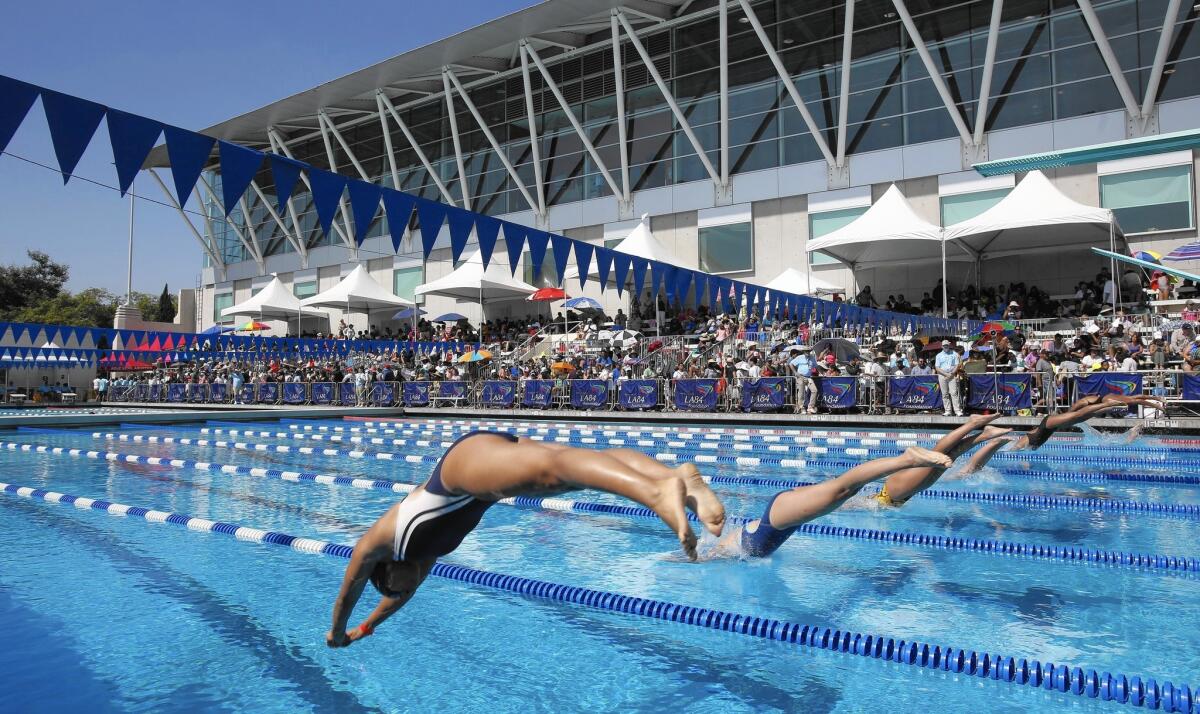What did L.A. get from the ’84 Games? An Olympic-size boost for kids

Los Angeles is on track to be our nation’s entry in the competition to host the Olympic games nine years from now.
As taxpayers begin fretting about what it might cost — the price tag is an estimated $4.5 billion — we’d do well to look back at our last turn as Olympics host and consider what that deal returned.
In 1984, Los Angeles staged what still is considered by many the best-managed and most-successful Olympics competition in history. It was run by businessman Peter Ueberroth and embraced by a city determined to show its most gracious side.
Los Angeles still is reaping the dividends of that extravaganza, which ended with a surplus of more than $232 million. Our city’s share — $93 million — funded the LA84 Foundation, which for the last 30 years has bankrolled local youth sports programs.
That $93 million is now $160 million, and that’s after more than $225 million has been distributed to more than 2,200 youth sports organizations in Southern California, serving 3 million young people.
The funds pay for big projects like after-school sports at Los Angeles middle schools and in neighborhoods where parks are scarce and family budgets are squeezed too tight to afford athletic gear and fees.
And they cover dozens of small requests each year from local groups — for things like soccer balls, umpire fees, coaching clinics, uniforms and swimming pool repairs.
Olympic medalist Anita DeFrantz has been at the helm of LA84 since its beginning, but she’s retiring at the end of this year.
I recently took her up on the offer to visit an event particularly close to her heart: the culmination of a learn-to-swim program that reaches 20,000 children every summer.
::
The LA84 Summer Swim Festival draws hundreds of children from more than a dozen teams to Exposition Park’s John C. Argue Swim Stadium, originally built so Los Angeles could host the 1932 Summer Games.
Unlike the Olympics, this annual contest is delightfully egalitarian.
There are no medal ceremonies and no minimum qualifying times. In fact, the winner’s circle is off limits to swimmers whose posted times are too fast.
Like Katelyn Onyekwelu of the L.A. County North Region team from the Antelope Valley. I watched her mother anxiously scanning the results, unable to find Katelyn’s name for the freestyle race that looked, from the stands, like she had won.
Mom was about to start hyperventilating when someone offered an explanation: Her daughter apparently had been disqualified. Preliminary scoring showed she’d finished faster than the 32.9-second ceiling that meet standards allow.
That would mean no medal, but 10-year-old Katelyn wasn’t disappointed. “It means I get to move up to Junior Olympics,” she said, a broad grin on her sun-baked face.
A few hours later, after Katelyn had finished two more competitions, officials flagged her down, said there had been an error and handed her a medal: Her time had actually netted first place in the “Girls 9-10 50-yard Freestyle” race.
She left with two medals and an invitation to join the Junior Olympics training program.
That means her parents will be making the 90-minute round trip from the Antelope Valley to Santa Clarita three or four times every week.
Still, Katrina Onyekwelu is thrilled. Mom worked as a lifeguard when she was growing up in St. Louis.
“I always wanted to swim competitively,” she said. But there were no teams or swim meets at local pools. “I always said if I had a child, I’d want her to be a swimmer.”
Now Onyekwelu is trying not to be “one of those overbearing parents,” she said. “At his point, Katelyn still loves it. It’s not really work to her to practice. I just hope that lasts.”
::
Even if the joy of practice doesn’t last, the lessons that sports offer will.
That’s what has kept DeFrantz involved in youth sports since her time as a competitive athlete ended. “The whole process — learning a skill, pushing yourself, making decisions, being part of a team — makes you stronger, better able to cope with all of life’s experiences,” she said.
“I believe sports is a birthright … Access ought to be available to everyone.”
No one would have imagined her future as an Olympic athlete back when DeFrantz was a kid in Indianapolis, swimming on a team from the ramshackle rec center at Frederick Douglass Park against “country club kids” with professional coaches and year-round access to heated pools. After two summers, her coach quit and the team had to disband.
She discovered rowing in college and six years later led the United States rowing team to a bronze medal in the 1976 Olympics in Montreal.
I didn’t spot Olympic potential at the pool during the swim festival. But I did see the importance of access, the thrill of success and the draw of camaraderie.
Some children seemed to me impossibly small to be so strong in the water. Some clearly were scared at the start — and jubilant just to have survived. Some didn’t finish until all the other swimmers had left the pool and dried off.
But even those stragglers climbed out of the water to hugs and applause.
Twitter: @SandyBanksLAT
More to Read
Sign up for Essential California
The most important California stories and recommendations in your inbox every morning.
You may occasionally receive promotional content from the Los Angeles Times.











